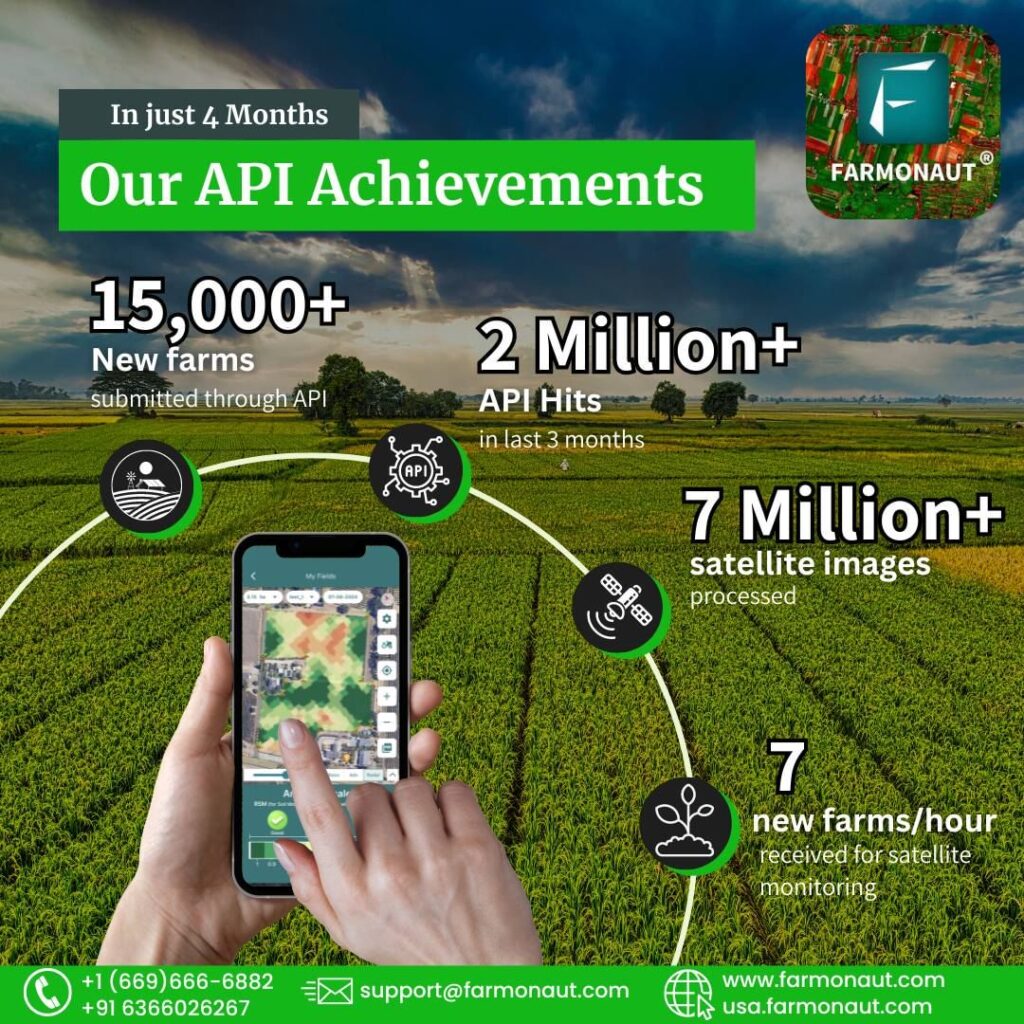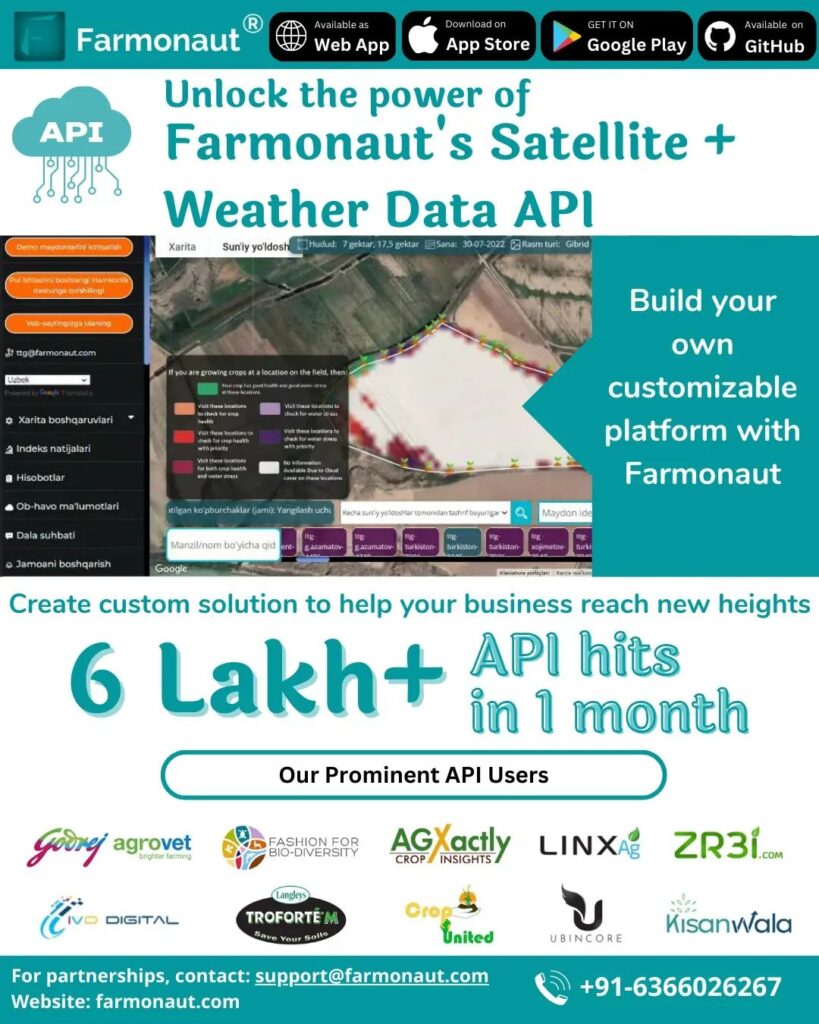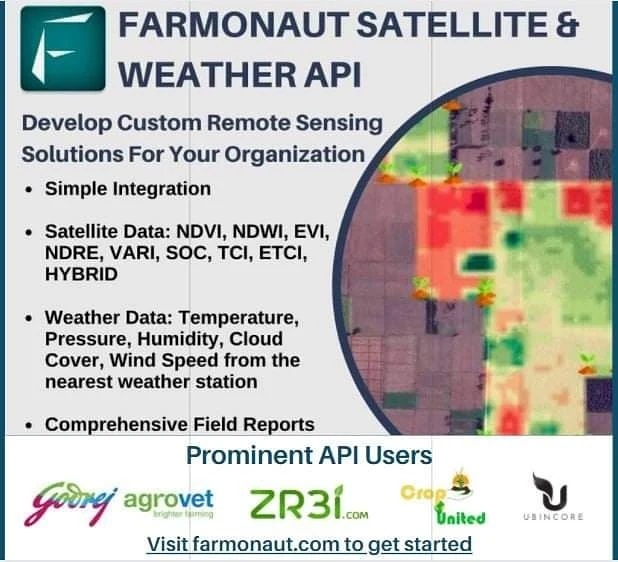Unlocking AI Innovation: Mastering API Management for Enterprise Growth and Security in the Digital Era

“90% of enterprises struggle with API sprawl, highlighting the critical need for effective API management strategies.”
In the rapidly evolving landscape of digital transformation, APIs (Application Programming Interfaces) have emerged as the cornerstone of innovation, enabling seamless integration and data exchange between diverse systems and applications. As we delve into the world of API management and AI-driven innovation, we’ll explore how organizations can harness these powerful tools to fuel business growth, enhance cloud performance, and navigate the complexities of the digital era.
At Farmonaut, we understand the critical role that APIs play in modern agriculture. Our platform leverages advanced API management techniques to provide farmers with real-time crop health monitoring, AI-based advisory systems, and blockchain-based traceability solutions. By mastering API management, we’ve been able to create a robust ecosystem that connects various agricultural technologies and data sources, ultimately empowering farmers to make data-driven decisions and optimize their operations.
The Rise of API-Driven Innovation in the Enterprise
As organizations increasingly rely on digital technologies to drive their operations and customer experiences, the number of APIs in use has grown exponentially. This proliferation of APIs, often referred to as “API sprawl,” presents both opportunities and challenges for enterprises seeking to leverage the full potential of their digital assets.
- Enhanced data access and system integration
- Improved agility and faster time-to-market for new products and services
- Increased collaboration and partnership opportunities
- Greater flexibility in adapting to changing market conditions
However, without proper management, API sprawl can lead to:
- Security vulnerabilities and increased risk of data breaches
- Reduced visibility and control over API usage
- Inefficiencies due to duplicate or redundant APIs
- Difficulties in maintaining and updating APIs across the organization
To address these challenges and unlock the full potential of APIs, organizations must implement robust API management strategies that prioritize security, scalability, and governance.
The Intersection of AI and API Management
As artificial intelligence continues to revolutionize various industries, its integration with API management has opened up new possibilities for innovation and efficiency. AI-driven API management solutions offer several key benefits:
- Automated API discovery and documentation
- Intelligent traffic management and load balancing
- Predictive analytics for API performance optimization
- Enhanced security through AI-powered threat detection
- Personalized API recommendations based on usage patterns
At Farmonaut, we’ve harnessed the power of AI in our API management approach to deliver more accurate and timely insights to farmers. Our Jeevn AI Advisory System analyzes data from various APIs, including satellite imagery and weather forecasts, to provide personalized recommendations for crop management and resource allocation.
Key Features of Modern API Management Platforms
To effectively manage APIs in the AI era, organizations need comprehensive platforms that offer a range of features designed to address the unique challenges of modern enterprise environments. Let’s explore some of the critical capabilities that businesses should look for in an API management solution:
| Feature | Description | Business Impact | AI Integration Potential |
|---|---|---|---|
| Security Protocols | Advanced authentication, encryption, and threat protection measures | Reduced risk of data breaches and compliance violations | AI-powered anomaly detection and real-time threat analysis |
| Scalability Options | Elastic infrastructure and load balancing capabilities | Improved performance and reduced downtime during peak usage | Predictive scaling based on AI-driven usage forecasts |
| Analytics Capabilities | Real-time monitoring and reporting on API usage and performance | Data-driven decision making and optimization of API resources | Advanced AI analytics for pattern recognition and predictive insights |
| Developer Portals | Self-service documentation, testing, and onboarding tools | Faster time-to-market for new integrations and improved developer experience | AI-assisted code generation and API discovery |
By implementing these features, organizations can create a robust API management framework that supports innovation, enhances security, and drives business growth in the digital era.
Explore Farmonaut’s API capabilities
Scaling APIs for Cloud Performance
As enterprises increasingly rely on cloud-based infrastructure, the ability to scale APIs effectively becomes paramount. Cloud-native API management solutions offer several advantages:
- Automatic scaling to handle fluctuating traffic loads
- Global distribution for improved latency and reliability
- Cost-effective resource utilization through pay-as-you-go models
- Seamless integration with other cloud services and tools
At Farmonaut, we’ve leveraged cloud-based API management to ensure that our satellite imagery and weather data APIs can handle the demands of thousands of farmers accessing critical information in real-time. This scalability has been crucial in supporting our mission to make precision agriculture accessible to farmers worldwide.
“AI-powered API platforms can reduce integration time by up to 75%, accelerating digital transformation efforts.”

API Security Best Practices in the AI Era
As APIs become more prevalent and critical to business operations, ensuring their security is paramount. Here are some best practices for API security in the age of AI:
- OAuth 2.0 and OpenID Connect: Implement robust authentication and authorization protocols
- API Gateways: Use centralized gateways to enforce security policies and monitor traffic
- Rate Limiting: Prevent abuse and ensure fair usage of API resources
- Data Encryption: Protect sensitive information in transit and at rest
- AI-Powered Threat Detection: Leverage machine learning algorithms to identify and respond to security threats in real-time
- Regular Security Audits: Conduct thorough assessments of API security measures and vulnerabilities
At Farmonaut, we prioritize the security of our APIs to protect sensitive agricultural data and ensure the trust of our users. Our blockchain-based traceability solution, for example, employs advanced security measures to maintain the integrity of supply chain information.
Addressing API Sprawl Challenges
As organizations embrace digital transformation, the number of APIs in use can quickly become overwhelming. Here are strategies to address API sprawl:
- API Discovery and Cataloging: Implement tools to automatically discover and catalog existing APIs across the organization
- API Lifecycle Management: Establish clear processes for API creation, testing, deployment, and retirement
- API Governance: Define and enforce standards for API design, security, and usage
- API Analytics: Use data-driven insights to identify redundant or underutilized APIs
- API Consolidation: Merge similar APIs and promote reuse of existing APIs where possible
By implementing these strategies, organizations can maintain control over their API ecosystem, reduce complexity, and optimize resource utilization.
Access Farmonaut’s API Developer Documentation
Integrating AI and APIs for Enhanced Data Access
The combination of AI and APIs creates powerful synergies that can dramatically improve data access and utilization within organizations. Here’s how:
- Intelligent Data Aggregation: AI-powered APIs can automatically collect and consolidate data from multiple sources, providing a comprehensive view of business operations
- Predictive Analytics: Machine learning algorithms can analyze API usage patterns to predict future data needs and optimize resource allocation
- Natural Language Processing: AI-enabled APIs can interpret and respond to natural language queries, making data access more intuitive for users
- Automated Insights: AI can analyze data flowing through APIs to generate actionable insights and recommendations
At Farmonaut, we’ve leveraged these AI-API integrations to provide farmers with more accurate and timely insights. Our system analyzes data from various APIs, including satellite imagery and weather forecasts, to deliver personalized recommendations for crop management and resource allocation.
Developing a Holistic API Strategy for Enterprise Success
To fully leverage the power of APIs and AI in driving digital transformation, organizations need to develop a comprehensive API strategy that aligns with their business goals. Here are key components of a successful API strategy:
- API-First Design: Prioritize API development in the early stages of product and service creation
- Cross-Functional Collaboration: Involve stakeholders from various departments in API strategy development
- Developer Experience: Create intuitive, well-documented APIs that encourage adoption and innovation
- Monetization Models: Explore opportunities to generate revenue through API products and services
- Continuous Improvement: Regularly assess and refine API strategies based on usage data and user feedback
By implementing a holistic API strategy, organizations can create a foundation for sustained innovation and growth in the digital economy.
Explore Farmonaut’s mobile apps:
The Future of API Management in the AI Era
As we look ahead, several trends are shaping the future of API management:
- Edge Computing: APIs will play a crucial role in managing data and applications at the network edge
- IoT Integration: API management platforms will need to handle the unique challenges of Internet of Things (IoT) devices and networks
- Quantum Computing: As quantum technologies emerge, API management solutions will need to adapt to new computational paradigms
- Ethical AI: API management platforms will incorporate features to ensure responsible and ethical use of AI-powered APIs
Organizations that stay ahead of these trends and adapt their API management strategies accordingly will be well-positioned to thrive in the evolving digital landscape.
Conclusion: Embracing API Management for Digital Transformation
In conclusion, mastering API management is crucial for organizations seeking to unlock the full potential of AI innovation and drive enterprise growth in the digital era. By implementing robust API management strategies, leveraging AI-powered solutions, and addressing challenges such as API sprawl and security, businesses can create a solid foundation for digital transformation.
At Farmonaut, we’ve witnessed firsthand the transformative power of effective API management in revolutionizing agriculture. By providing farmers with easy access to advanced technologies and data-driven insights through well-managed APIs, we’re helping to create a more sustainable and productive agricultural sector.
As we move forward, the organizations that prioritize API management and embrace the synergies between APIs and AI will be best positioned to innovate, adapt, and thrive in an increasingly connected and data-driven world.
Earn with Farmonaut:
Earn 20% recurring commission with Farmonaut’s affiliate program by sharing your promo code and helping farmers save 10%. Onboard 10 Elite farmers monthly to earn a minimum of $148,000 annually—start now and grow your income!
Learn more about our affiliate program
FAQ: API Management and AI Innovation
Q: What is API management?
A: API management refers to the processes and tools used to create, publish, document, and analyze APIs in a secure and scalable environment. It encompasses the entire API lifecycle, from design to retirement.
Q: How does AI enhance API management?
A: AI can improve API management by automating tasks like API discovery, traffic management, and security threat detection. It can also provide predictive analytics for API performance optimization and personalized recommendations based on usage patterns.
Q: What are the key challenges in API management?
A: Common challenges include API sprawl, security vulnerabilities, scalability issues, and maintaining consistency across multiple APIs. Effective governance and documentation are also crucial challenges to address.
Q: How can organizations address API sprawl?
A: Organizations can address API sprawl by implementing API discovery and cataloging tools, establishing clear governance policies, conducting regular API audits, and promoting API reuse and consolidation where appropriate.
Q: What role do APIs play in digital transformation?
A: APIs are fundamental to digital transformation, enabling seamless integration between systems, facilitating data exchange, and supporting the development of new digital products and services. They allow organizations to become more agile and responsive to market changes.















